Cardinal Tomás Ó Fiaich: Blue plaque tribute to church leader
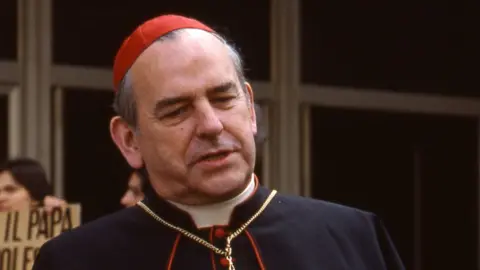 Getty Images/Edoardo Fornaciari
Getty Images/Edoardo FornaciariA blue plaque in tribute to Cardinal Tomás Ó Fiaich - a former leader of the Catholic Church in Ireland - has been unveiled in County Armagh.
Cardinal Ó Fiaich served as the Catholic Primate of All Ireland from 1977 until his death in 1990.
He was also a noted academic and linguist who lectured in modern history and was renowned for his passion for the Irish language and Irish folklore.
The plaque at his former family home marked the centenary of his birth.
The honour was bestowed by the Ulster History Circle, following lobbying by members of the Creggan History Society.
"Tomás, Cardinal Ó Fiaich is renowned for his dedication to the church, to Celtic history and to Irish language and he is remembered as an inspiring leader and champion," Ulster History Circle chairman Chris Spurr said.
Cardinal Ó Fiaich was an outspoken and sometimes controversial public figure during the Troubles in Northern Ireland.
He strongly opposed the use of violence on all sides of the conflict and worked with Protestant church leaders to appeal for peace and reconciliation between the nationalist and unionist communities.
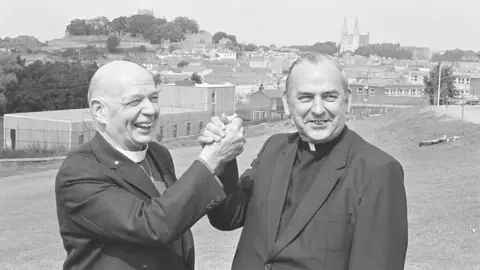 Pacemaker
PacemakerHe consistently condemned IRA murders, preaching that "the political problems of our country cannot be solved by methods contrary to God's law".
But he also publicly criticised UK government policy in Northern Ireland, including the treatment of IRA prisoners, and once snubbed a meeting with the then Prime Minister Margaret Thatcher.
Speaking at Friday's event, the current Catholic Primate of All Ireland, Archbishop Eamon Martin, said Cardinal Ó Fiaich was often "misunderstood by some who would have unfairly labelled him as a partisan".
He added: "The blue circle we unveil today is a fitting tribute to a man whose circle of friendship went far and wide to embrace people of every nation, language and creed."
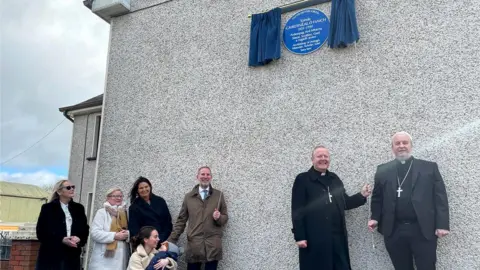 Ulster Histtory Circle
Ulster Histtory CircleCardinal Ó Fiaich was born Thomas James Fee on 3 November 1923.
He was the second son of two schoolteachers and grew up in the townland of Anamar, halfway between the villages of Cullyhanna and Crossmaglen.
His mother died while he was a young boy and so his aunt helped to raise him and his older brother.
The young Thomas Fee studied Irish at the Donegal Gaeltacht (Irish-speaking area) as a child and as a young man he began to use the Irish version of his name exclusively.
He was educated at St Patrick's College in Armagh city and then in his late teens he entered Ireland's biggest seminary, St Patrick's College in Maynooth in County Kildare.
"Father Tom", as he was fondly known by friends throughout his life, was ordained as a priest in 1948.
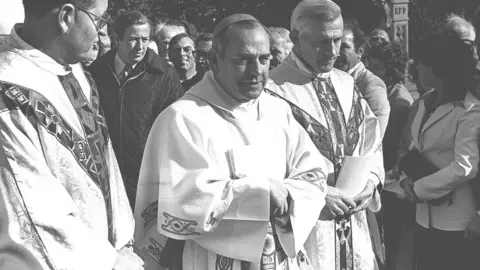 Pacemaker
PacemakerBut he still continued his academic career and took a job as a lecturer in modern history at Maynooth.
He had a particular interest in early Irish Christianity and authored several books on the subject.
He was later appointed president of the college in 1974.
When the Catholic Primate William Conway died in 1977 after a short illness, the then Monsignor Ó Fiaich was something of an unexpected choice as his replacement in the top job.
The academic had never even held the post of bishop before his appointment as Archbishop of Armagh and Primate of All Ireland.
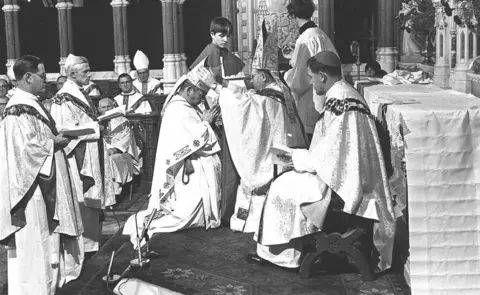 Pacemaker
PacemakerBut he proved a popular choice and within two years he had been elevated to the role of cardinal.
He also welcomed Pope John Paul II to Ireland in 1979 for the first ever papal visit to the country.
However, as an avowed republican born and bred in a part of south Armagh nicknamed "bandit country" during the Troubles, some viewed Cardinal Ó Fiaich with suspicion.
He spoke from the pulpit about the "unnatural division of our country" and once enraged unionists by saying British soldiers should be withdrawn from Northern Ireland and replaced by United Nations peacekeepers.
During the 1981 IRA hunger strike he declined to attend a meeting with Mrs Thatcher due to prior church business, in a move widely viewed as a snub to the then prime minister.
Some sections of the press accused him of being the IRA's chaplain because of his prison welfare work, while the Sunday Express caricatured him as a recruiting sergeant for republican paramilitaries.
When he refused to support calls for Catholics to join the police in 1987, he was condemned as an "evil prelate" in the House of Lords by unionist peer Lord Brookeborough.
That remark caused outrage and was later withdrawn but Cardinal Ó Fiaich too was sometimes guilty of making offensive comments.
In 1985 he caused widespread hurt by claiming: "I think 90% of religious bigotry is to be found among Protestants. Whereas the bigotry one finds among Catholics is mainly political."
But he managed to patch up his sometimes strained relations with Protestant church leaders and promote ecumenism.
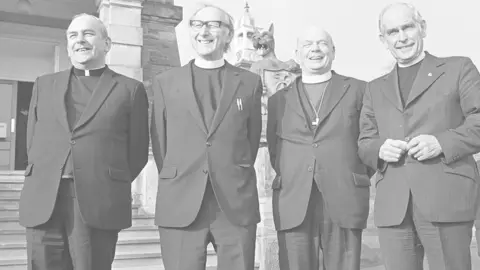 Pacemaker
PacemakerHe continued to work with them to meet politicians and campaign for an end to violence.
In May 1990, Cardinal Ó Fiaich died suddenly after suffering a suspected heart attack while on a pilgrimage to Lourdes in France.
His death aged 66 was considered a great loss to the Irish language movement and to his many friends and supporters.
Memorials to him include the Cardinal Tomás Ó Fiaich Library in Armagh city and the Cultúrlann McAdam Ó Fiaich cultural centre in west Belfast.
The village square in Crossmaglen is also named in his honour.
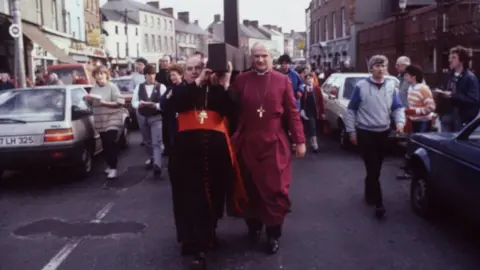 Pacemaker
PacemakerThe campaign for a blue plaque was led by Creggan History Society, based in the cardinal's native parish of Lower Creggan.
"He was a man of the people," society member Gearóid Trimble told BBC News NI.
"Despite holding high office within the Church he was very much rooted in his community and family."
The plaque was unveiled at Cardinal Ó Fiaich's home on Kiltybane Road at 12:00 GMT on Friday.
